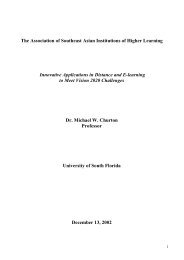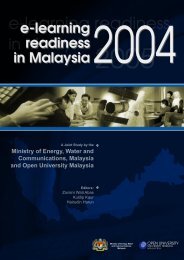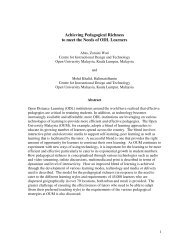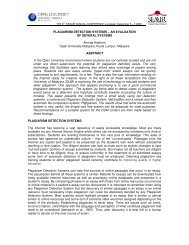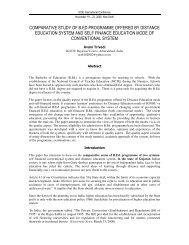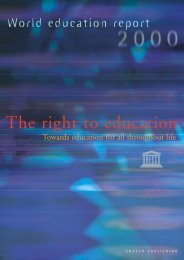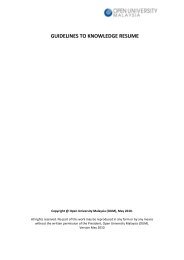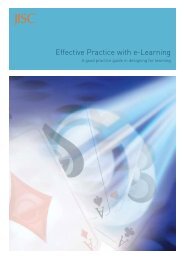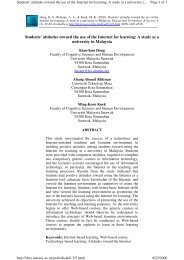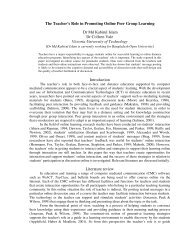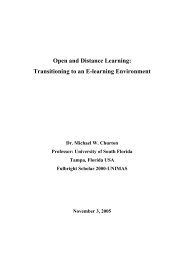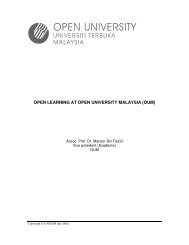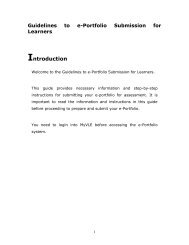programmes. However, among those importers, Hong Kong (China), India <strong>and</strong> Malaysiahave also exported their programmes to other countries such as Bangladesh, China,Indonesia <strong>and</strong> Sri Lanka (Jung, 2004a).Moreover, many conventional DE institutions have begun to introduce information <strong>and</strong>communication technology (ICT) mainly as supplementary modes of instruction. Someinstitutions including a few mega universities have created e-<strong>learning</strong> programmes.Examples include the e-MBA programme of the Anadolu University in Turkey, the onlineLifelong Education Graduate School at the Korea National Open University in Korea, theonline MBA of the Athabasca University in Canada. Besides these institutions, for-profite-<strong>learning</strong> providers have appeared in the DE market. In the <strong>Asia</strong>-<strong>Pacific</strong> region, mainproviders of e-<strong>learning</strong> include Thomson Learning, Apollo International <strong>and</strong> UNext.These trends challenge the existing quality assurance (QA) frameworks of DE, whichhave focused more on widening access than on assuring quality, <strong>and</strong> often do not addressfor-profit <strong>and</strong> cross-border <strong>education</strong>. Especially in the context of growing globalisationin <strong>distance</strong> <strong>education</strong>, there has been an urgent need for international initiatives to reviewquality assurance mechanisms of DE for <strong>higher</strong> <strong>education</strong> at the national <strong>and</strong> institutionallevel, discuss new challenges of a changing DE environment, <strong>and</strong> build a capacity forQA to enhance the quality provision in a globalised <strong>higher</strong> <strong>education</strong> market. QA inmega universities is considered to be especially important since those mega universitiesprovide <strong>higher</strong> <strong>education</strong> to millions of students around the world with collaboration or incompetition with for-profit or cross-border providers.Recently, several studies have attempted to evaluate QA systems of DE for <strong>higher</strong><strong>education</strong> at the national or institutional level <strong>and</strong> discuss issues related to QA with theemergence of virtual universities or e-<strong>learning</strong> programmes (for example, Jung, 2004a;2004b; UNESCO, 2003; <strong>and</strong> OECD, 1999). Moreover, international organisations such asUNESCO, Commonwealth of Learning (COL), OECD <strong>and</strong> World Bank have suggestedQA guidelines for <strong>distance</strong> <strong>education</strong> <strong>and</strong>/or cross border <strong>higher</strong> <strong>education</strong>. 2 Thesestudies reveal that the QA frameworks of DE in a globlised context are still in the earlystages of development. The studies also indicate the need for investigating a wide rangeof QA practices in different contexts of <strong>distance</strong> <strong>education</strong> <strong>and</strong> discussing QA matters indepth at the international level.SURVEY OVERVIEWThe present chapter aims to report the results of a survey 3 on QA practices in megauniversities, discuss the convergence <strong>and</strong> diversity of those QA practices, <strong>and</strong> draw policyconsiderations for other <strong>distance</strong> <strong>education</strong> institutions. Even though the terms for qualityassurance in <strong>distance</strong> <strong>education</strong> vary across mega universities, in this report, the terms areused as defined below. 4Objectives of the surveyThere were two practical reasons for conducting the survey. The first related to the 2003World Summit of Mega Universities on Innovation <strong>and</strong> Collaboration – Joint Action forthe Future of Distance Education (Shanghai, China, 6-7 November 2003), which raisedthe need for information sharing on QA systems in the mega universities. This surveywas a follow-up action requested by the mega universities at the Summit. The second wasto report QA practices <strong>and</strong> issues in the mega universities at the Second Global Forumon International Quality Assurance, Accreditation <strong>and</strong> the Recognition of Qualification80
(Paris, France, 28-29 June 2004) in pursuit of empowering participants for informeddecision-making <strong>and</strong> providing an opportunity for capacity building for quality assuranceto enhance the quality provision in an internationalised DE market.Key aspects of the survey included QA organisation, QA policies, QA methods,objectives of QA activities, QA areas <strong>and</strong> criteria, QA system for imported/exporting<strong>distance</strong> <strong>education</strong> programmes, QA system for e-<strong>learning</strong>, <strong>and</strong> link to national QAframeworks for <strong>distance</strong> <strong>education</strong>.Participants in the surveyThe survey, conducted between May <strong>and</strong> early June 2004, was sent out to the presidents(or vice-chancellors) <strong>and</strong>/or the heads of QA units in 11 mega universities in differentregions. Those 11 mega universities included the Allama Iqbal Open University (AIOU,Pakistan); the Anadolu University (Anadolu, Turkey); the China Central Radio <strong>and</strong> TVUniversity (CCRTVU, China); the Indira G<strong>and</strong>hi National Open University (IGNOU,India); the Universitas Terbuka (UT, Indonesia); the Korea National Open University(KNOU, Korea); the Payame Noor University (Iran); the Sukhothai Thammathirat OpenUniversity (STOU, Thail<strong>and</strong>); the Open University (OU, UK); the University of SouthAfrica (South Africa); <strong>and</strong> the Shanghi TV University (SHTVU, China). Table 7.1 showsprofiles of nine mega universities that responded to the survey questionnaire.Table 7.1: Profiles of the Nine Mega Universities Participating in the SurveyINSTITUTIONYEAR OFESTABLISHMENTNUMBER OFDE STUDENTSNUMBER OF ACADEMIC STAFFFULL-TIMEPART-TIMENUMBER OFADMINISTRATIVESTAFFAIOU (Pakistan) 1974 456,126 145 23, 000 (tutors) 1,426Anadolu (Turkey)1958(1982 named Anadolu)884,081 1,729653 (tutors)300 (lecturers)CCRTVU (China) 1979 2,300,000 52,600 31,500 (tutors) 16,500IGNOU (India) 1985 1,013,631 339 35 1,337KNOU (Korea) 1972 196,402 271 108 (tutors) 546OU (UK) 1969 203,744 1,1697,995(Associatelecturers)1,7631,434(Academic-related staff)2,139(Secretarial, clerical,<strong>and</strong> technical staff)SHTVU (China) 1960 101,218 Info. Not Given Info. Not Given Info. Not GivenSTOU (Thail<strong>and</strong>) 1978 181,372 375 Info. Not Given 904UT (Indonesia) 1984 222,068 762 3,600 (tutors) 730SURVEY RESULTSQA structures <strong>and</strong> policiesTo assure the quality of its services, an institution as a whole must have a set of policies<strong>and</strong> structures to direct organisational activities. The mega universities surveyed havedifferent types <strong>and</strong> levels of organisational structures <strong>and</strong> policies on QA.81
- Page 1 and 2:
PERSPECTIVES ONDISTANCE EDUCATIONLi
- Page 3 and 4:
The Commonwealth of Learning (COL)
- Page 5 and 6:
ACKNOWLEDGEMENTSIn addition to the
- Page 7 and 8:
These are some of the issues that a
- Page 9 and 10:
What are the trends and issues in l
- Page 11 and 12:
of policy implications relating to
- Page 13 and 14:
evince important differences that c
- Page 15 and 16:
inequitable regulations governing t
- Page 17 and 18:
associations and groups of countrie
- Page 19 and 20:
THE CONTRIBUTORChristopher McIntosh
- Page 21 and 22:
INTRODUCTIONIn his 1996 report to U
- Page 23 and 24:
Lastly, our analysis of the situati
- Page 25 and 26:
diploma or similar certificates of
- Page 27 and 28:
force of the undertaking. Here agai
- Page 29 and 30:
RELEVANT INTERNET SITESUNESCO Task
- Page 31 and 32:
Notes1. This phrasing has been used
- Page 33 and 34:
goals (Daniel, 1996). Lifelong lear
- Page 35 and 36: eported that group activity had red
- Page 37 and 38: NEW AREAS FOR DISTANCE EDUCATION:WO
- Page 39 and 40: targets systematically for the use
- Page 41 and 42: Rausch, A.S. (2003). A case study o
- Page 43 and 44: correspondence teaching systems tha
- Page 45 and 46: significant differences between syn
- Page 47 and 48: In distance flexible- and blended-e
- Page 49 and 50: STATE-FUNDED DUAL-MODE SYSTEMS ATUN
- Page 51 and 52: Table 4.2: Fundable elements in dis
- Page 53 and 54: sciences in 21 countries of the reg
- Page 55 and 56: How a system is funded depends in p
- Page 57 and 58: Litto, Fredric M. (2004). Digital l
- Page 59 and 60: CHAPTER 5LIFELONG LEARNING IN THE A
- Page 61 and 62: education, which was initiated by C
- Page 63 and 64: So the virtual classroom acted as a
- Page 65 and 66: In June 2002, when the course came
- Page 67 and 68: RELEVANT INTERNET SITESFORCIIR proj
- Page 69 and 70: 11. The approximate rate for 1€ w
- Page 71 and 72: The term modern distance education
- Page 73 and 74: the National Networked Consortium f
- Page 75 and 76: important resource for undeveloped
- Page 77 and 78: standards have been proposed for th
- Page 79 and 80: The development of e-learning withi
- Page 81 and 82: RELEVANT INTERNET SITESCCRTVU Onlin
- Page 83 and 84: MoE (2004b) The Notice on Running N
- Page 85: CHAPTER 7QUALITY ASSURANCE SURVEYOF
- Page 89 and 90: Examples of elaborated QA policies:
- Page 91 and 92: plans and produces its conventional
- Page 93 and 94: SHTVU (China)• Teaching• Teachi
- Page 95 and 96: offers its programmes to Turkish ci
- Page 97 and 98: mega universities apply a set of st
- Page 99 and 100: RELEVANT INTERNET SITESThe Commonwe
- Page 101 and 102: 2. QA initiatives or publications b
- Page 103 and 104: assurance of ODL. This DST will be
- Page 105 and 106: Educational Planning has been respo
- Page 107 and 108: A system of weighting of the key qu
- Page 109 and 110: RELEVANT INTERNET SITESHigher Educa
- Page 111 and 112: CHAPTER 9THE FINNISH VIRTUAL UNIVER
- Page 113 and 114: foreign providers. In Finland, the
- Page 115 and 116: to make the best use of new educati
- Page 117 and 118: The foremost task for the Service U
- Page 119 and 120: part of quality management. The aim
- Page 121 and 122: online courses; an educational tech
- Page 123 and 124: polytechnics, research institutions
- Page 125 and 126: CHAPTER 10PROMOTING CROSS-BORDERREC
- Page 127 and 128: The Bologna Declaration was followe
- Page 129 and 130: indicators currently being used for
- Page 131 and 132: the qualification resulting from th
- Page 133 and 134: Table 9.1: Outline of the portfolio
- Page 135 and 136: • Make sure that incoming student
- Page 137 and 138:
CHAPTER 11CHARTING THE EVOLUTIONOF
- Page 139 and 140:
Another common characteristic was t
- Page 141 and 142:
the current capacity of the educati
- Page 143 and 144:
conditions for success. Conditions
- Page 145 and 146:
Cultural and ethical issues in inte
- Page 147 and 148:
the cost and maintenance of learnin
- Page 149 and 150:
Research can be a useful tool for c
- Page 151 and 152:
REFERENCESBates, A. (1995). Technol
- Page 153 and 154:
Twigg, C. (2001). Quality Assurance
- Page 155 and 156:
y, for example, entering into partn
- Page 157 and 158:
and even greater steps, and the dec



